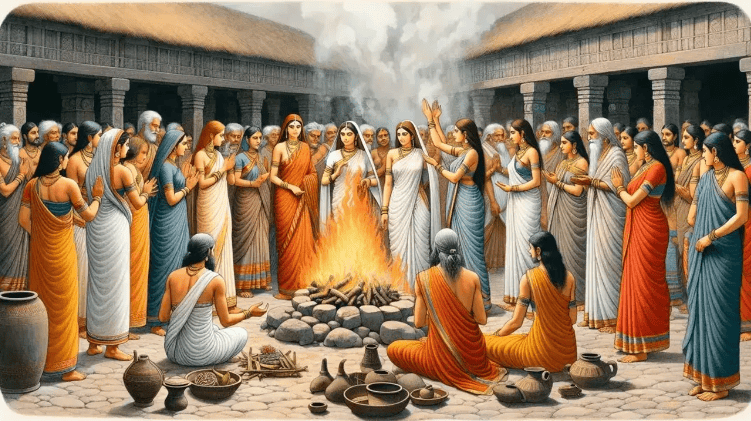UPSC Exam > UPSC Notes > History Optional for UPSC > Condition of Women
Condition of Women | History Optional for UPSC PDF Download
| Table of contents |

|
| Introduction |

|
| Women Education |

|
| Property Rights |

|
| Institution of Marriage |

|
Introduction
As in the earlier period, status of women was subordinate to that of men. Married women were required to be devoted to their husband and also to obey then blindly.

Wife's Duty of Service:
- A writer explains that a wife should provide personal services to her husband, like washing his feet, similar to how a servant would. However, this is conditional on the husband being righteous and free from hatred and jealousy towards his wife.
Husband's Duty of Maintenance:
- It is the husband's responsibility to support his wife under all circumstances. He should not abandon a faithful wife, even if she is unattractive or speaks harshly.
Women Education
- Women were still denied the right to study the Vedas.
- The marriageable age for girls was lowered, which negatively impacted their chances for higher education.
- The absence of women teachers in dictionaries from that time reflects the poor state of higher education for women.
- Despite this, some dramatic works from the period show that court ladies and even the queen’s maids-in-waiting were skilled in composing Sanskrit and Prakrit verses.
- Various stories highlight the talents of princesses in fine arts, particularly painting and music. Daughters of high officials, courtesans, and concubines were also renowned for their skills in arts, including poetry.
- Women, in general, were distrusted and were expected to live in seclusion, with their lives regulated by male relatives such as fathers, brothers, husbands, or sons. However, within the home, they were honored.
- Upper-class women lived in seclusion and were usually kept out of the public eye. There was no strict system of purdah or veiling of women.
- Abu Zaid, a tenth-century Arab traveler, observed that many Indian princes allowed their women to be seen unveiled during court sessions, even by foreigners.
Question for Condition of WomenTry yourself: What was the traditional role of women in society during the period discussed?View Solution
Property Rights
Development of Women's Property Rights in Feudal Society:
- Even if a wife exhibited bad behavior, she was entitled to maintenance if her husband abandoned her.
- As property rights in land expanded, so did women's property rights.
- To protect family property, women were granted the right to inherit property from their male relatives.
- A widow was generally entitled to her husband's entire estate if he died without a son, though there were some exceptions.
- Daughters also had the right to inherit their mother's property.
- The rise of feudal society bolstered the idea of private property.
Institution of Marriage
Marriage Practices in Ancient India:
- Age of Marriage: According to ancient texts, girls were typically married off by their parents between the ages of six to eight or after their eighth birthday but before reaching puberty.
- Forms of Marriage: The Gandharva form of marriage, where a woman chooses her own husband, was criticized by the commentator Medhatithi. He considered marriages between Brahmanas and Kshatriya or Vaisya women as exceptions, while forbidding Brahana men from marrying Sudra women.
- Remarriage Rights: A woman was permitted to take a second husband under certain circumstances, such as if her husband was missing,dead, had become a recluse, was impotent, or had been ostracized.
- Adultery Punishments: Strict punishments were imposed for adultery, ranging from death for both parties to lesser penalties.
- Widowhood Practices: Widows were expected to lead lives of strict celibacy and self-restraint. The practice of sati, where a widow would self-immolate on her husband’s funeral pyre, was made obligatory by some but condemned by others.
- Sati Practice: Some writers made sati mandatory, while others opposed it. The Arab writer Sulaiman noted that royal wives had the option to commit sati.
- Influence of Chiefs: The rise of chiefs maintaining numerous women and property disputes contributed to the spread of sati.
- Temple Service Dedication: There was a practice of dedicating maidens for service in temples, and a class of prostitutes known as Ganikas existed, distinguished by their high standards of living and qualifications.
- Female Rulers: In regions like Orissa and Kashmir, women like Prabhavati Gupta and Queen Didda ruled effectively, with Prabhavati Gupta serving as regent and Didda governing for fifty years.
- Ordinary Women’s Lives: Information on ordinary women is scarce, but they likely worked hard alongside men, managing household duties and child-rearing in addition to agricultural or other labor.
The document Condition of Women | History Optional for UPSC is a part of the UPSC Course History Optional for UPSC.
All you need of UPSC at this link: UPSC
|
367 videos|995 docs
|
Related Searches















